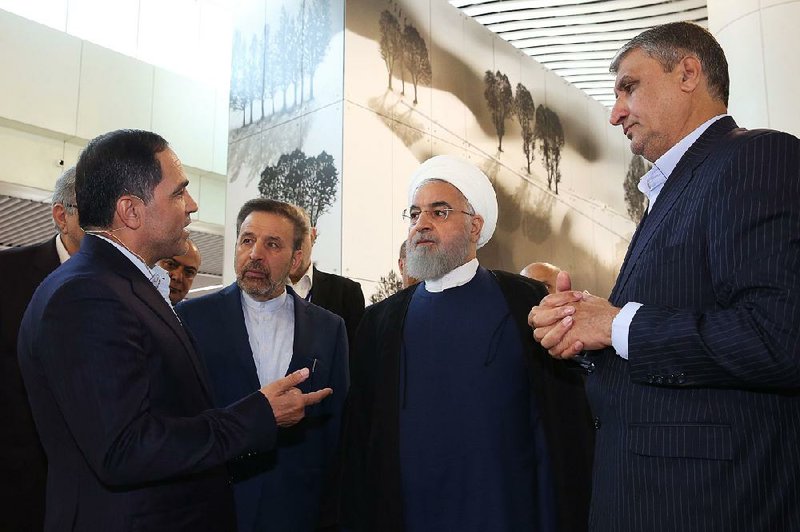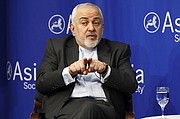JERUSALEM -- Iran should not "mistake U.S. prudence and discretion for weakness," the U.S. national security adviser said Sunday, addressing the decision to call off U.S. military strikes against Iran.
John Bolton emphasized that the U.S. reserved the right to attack Iran at a later date.
"No one has granted them a hunting license in the Middle East. As President [Donald] Trump said on Friday, our military is rebuilt, new and ready to go," Bolton said in Jerusalem alongside Israeli Prime Minister Benjamin Netanyahu, who is also a vocal critic of Iran.
Bolton was referring to a Friday tweet in which Trump also said he was "in no hurry" to attack Iran.
The U.S. military strikes were initially planned in response to the downing of an American surveillance drone on Thursday.
Iranian President Hassan Rouhani blamed the United States' "interventionist military presence" for fanning the flames.
"The region is very sensitive, and security of the Persian Gulf and Gulf of Oman waterways is important to many countries," Rouhani said, according to the official Islamic Republic News Agency. "We expect international bodies to show proper reaction to the invasion move," he added about the drone that Iran says violated its airspace.
Also Sunday, Iran-allied Yemeni rebels attacked an airport in Saudi Arabia ahead of a visit to that country by U.S. Secretary of State Mike Pompeo. The secretary of state, who said he wants to build a global coalition against Iran, planned to visit the United Arab Emirates after meeting with Saudi officials.
Pompeo's visit and Bolton's comments were aimed at reassuring key U.S. allies that the White House is committed to maintaining pressure on Iran. The national security adviser is visiting Israel for three-way talks with his Israeli and Russian counterparts that are expected to focus on Iranian involvement in conflicts across the region, including in neighboring Syria.
Bolton has been widely criticized in Iran, where officials believe he is pushing the U.S. into a Mideast conflict. Mohammad Javad Zarif, the country's foreign minister, tweeted that the presidential adviser was "moments away from trapping" Trump into a "war" before the U.S. president called off the strikes against Iran over concerns about casualties.
Also on Sunday, a top Iranian military commander warned that any conflict with Iran would have uncontrollable consequences and endanger the lives of U.S. forces. Maj. Gen. Gholamali Rashid's remarks, published by the semi-official Fars news agency, were made while addressing Iran's powerful Revolutionary Guards Corps during a field visit to a command center for Iranian radar and missile systems.
LAWMAKERS WEIGH IN
Sen. Tom Cotton, R-Ark., said Sunday that if Trump had followed through on a retaliatory strike in response to an attack on an unmanned aircraft, it would have been justified.
"What I see is Iran steadily marching up the escalation chain," Cotton said on Fox News Sunday. "It started down with threats, it went into an attack on vessels in ports, went into attack on vessels at sea, now to unmanned American aircraft. I fear that if Iran doesn't have a firm set of boundaries drawn around this behavior, we are going to see an attack on a U.S. ship or U.S. manned aircraft."
Cotton praised Trump's policy on Iran, noting the new set of sanctions expected to be announced today and saying, "It's probably the first time in 40 years where we have the initiative against Iran."
Rep. Mac Thornberry, R-Texas, said Sunday on ABC's This Week that Trump "is clearly trying to navigate a fine line to show that you cannot attack Americans and American military equipment without having a response."
"At the same time, he's very conscious of not getting on an escalatory ladder that leads to a military conflict that neither side wants," said Thornberry, the top Republican on the House Armed Services Committee.
In an interview that aired Sunday on NBC's Meet the Press, Trump said that he thinks Iranian leaders want to negotiate and that he's willing to talk to them with "no preconditions" about the country never acquiring nuclear weapons.
Trump said the proposed discussions have "nothing to do with oil."
"Here it is. Look, you can't have nuclear weapons," Trump said. "And if you want to talk about it, good. Otherwise you can live in a shattered economy for a long time to come."
But Rep. Adam Smith, D-Wash., said that if Trump's goal is to prevent Iran from acquiring nuclear weapons, then he should not have pulled out of the 2015 nuclear deal negotiated under then-President Barack Obama. The current "maximum pressure" campaign has backed the Islamic Republic into a corner and forced them to lash out, Smith said.
"Even though we knew they were going to do it, we didn't know how to respond, and it's not getting them to the negotiating table," Smith, chairman of the House Armed Services Committee, said on CBS. "They're not there."
Trump, in his NBC interview, said he believed that Iran was in violation of the nuclear deal long before he pulled the U.S. out of it.
"I think they have violated the agreement because I think in the areas [of Iran] that we're not allowed to inspect, they're doing things," Trump said. "And I think they have been for years."
Netanyahu on Sunday said Iranian involvement in conflicts across the region had increased as a result of the nuclear deal, which lifted sanctions on Iran in exchange for limits on its uranium enrichment levels.
"After the deal, but before recent events, Iran has been on a campaign of aggression," Netanyahu said. "Those who describe the recent actions as somehow opening a hornet's nest are living on another planet."
HOUTHI ATTACK
The attack by Yemeni rebels allied with Iran killed one person and wounded seven others on Sunday, the Saudi military said.
The rebels, known as Houthis, targeted the Saudi airport in Abha. Saudi Arabia has been at war with the Houthis in Yemen for more than four years.
A Houthi spokesman, Yahia al-Sarie, said earlier Sunday that the rebels had launched drones targeting Saudi airports in the southern cities of Abha and Jizan.
Pompeo's meetings this week in Saudi Arabia will be held in the Red Sea city of Jeddah, about 315 miles north of the Saudi airport in Abha. The meetings were arranged last week as additions to a trip to India, then to Japan and South Korea with Trump.
Pompeo, who addressed reporters from the tarmac before he boarded his airplane in Washington, declared that the goal of his talks with the Saudi kingdom and the UAE is to deny Iran "the resources to foment terror, to build out their nuclear weapon system, to build out their missile program."
"We are going to deny them the resources they need to do that, thereby keep American interests and American people safe all around the world," he said.
Pompeo said the world must be prepared to push back against Iran, which he called "the world's largest state sponsor of terror."
But Pompeo also affirmed Trump's statement that the U.S. is prepared to negotiate with Iran, without preconditions, in a bid to ease tensions.
"They know precisely how to find us," Pompeo said.
America's European allies have expressed concern about the standoff. A top British diplomat was in Tehran on Sunday to discuss preventing any "escalation and miscalculation," according to the U.K. Foreign Office.
The two-day visit of Andrew Murrison, the U.K.'s minister of state for the Middle East, was aimed at "open, frank and constructive engagement" with his Iranian counterparts, according to the Foreign Office. This included reiterating the U.K.'s assessment that Iran almost certainly bears responsibility for recent attacks on oil tankers in the Gulf of Oman, which Iran denies.
Murrison added that Iran must continue to meet its commitments under the nuclear deal. Iran has threatened to breach the limits set on its uranium stockpile in the coming days if European powers don't find a way to circumvent U.S. sanctions.
Information for this article was contributed by Aron Heller, Darlene Superville, Nasser Karimi, Aya Batrawy and Matthew Lee of The Associated Press; and by Mark Niquette, Ros Krasny, Margaret Talev, Fiona MacDonald, Ivan Levingston, Henry Meyer, Zainab Fattah, Filipe Pacheco, Jonathan Tirone, Ben Brody, Hailey Waller and Zaid Sabah of Bloomberg News.
A Section on 06/24/2019

